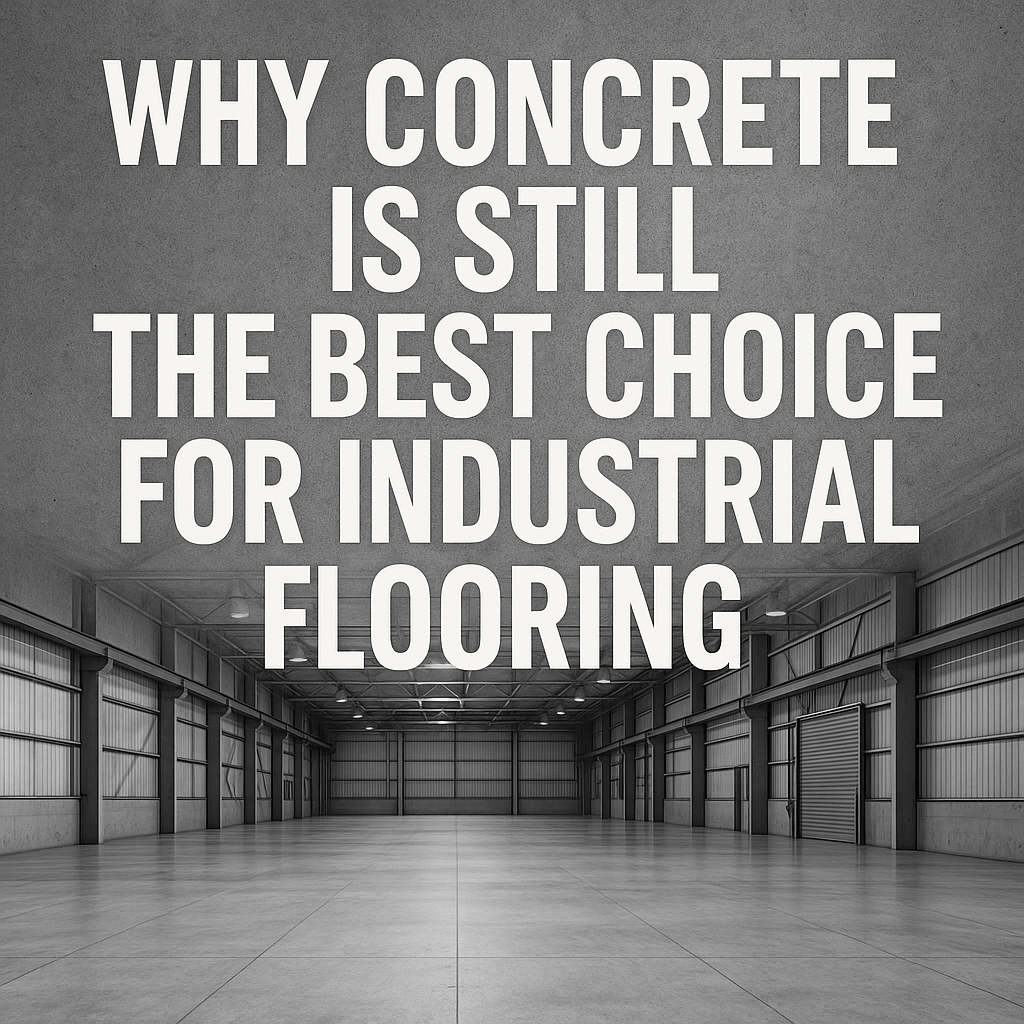
-
Concrete flooring is highly durable, capable of withstanding heavy loads and foot traffic.
-
It offers cost-effective solutions, especially for large-scale industrial applications.
-
Versatility in finishes, such as polished concrete and epoxy coatings, caters to various operational needs.
-
Requires minimal maintenance, ensuring consistent performance in industrial settings.
-
Enhances safety by offering slip-resistant finishes and stain resistance.
-
Ideal for industries prone to chemical spills, heavy machinery usage, and hygiene demands.
Introduction
Industrial flooring is very important in places where there is heavy machinery, lots of foot traffic, and tough conditions. When looking for the best option, concrete stands out as the top choice. It is durable and versatile. Concrete flooring can handle constant pressure better than any other materials. Its solid results make it a great solution in warehouses and manufacturing facilities. That’s why concrete is still the right flooring for industrial settings.
Benefits of Concrete Flooring in Industrial Settings
Concrete flooring is still a top choice in industrial environments because it is very strong and durable. It can take a lot of wear from heavy equipment and machinery, which makes it essential for factories and warehouses.
Moreover, concrete floors are simple to clean and care for, which is important for industries that focus on hygiene. They can handle busy foot traffic and resist harm from chemical spills. This makes concrete flooring a trustworthy and effective option for different industrial needs.
Durability and Longevity of Concrete Floors
Concrete flooring is known for its great durability. This makes it a top choice for heavy-duty industrial use. It is strong enough to support the weight of machinery and forklifts. It can also withstand frequent operations without cracking or bending. This strength is perfect for industries that need flooring to handle constant pressure every day.
Another benefit is its ability to last for many years. Concrete floors are low maintenance. They only need simple cleaning and quick repairs to remain in good condition. This long life makes concrete an affordable choice over time, as you don’t need to replace it often.
Additionally, concrete flooring reduces risks from wear and tear. It holds up well under heavy foot traffic or tough conditions. Industries that look for strength and reliability find concrete to be the best option for their tough environments.
Cost-Effectiveness of Concrete for Large Scale Applications
Concrete flooring is seen as the best choice for industrial flooring. It is easy to install, which helps lower labor costs compared to other types of flooring. For businesses with tight budgets, concrete offers great value while still being strong and durable.
Its long lifespan adds to savings because companies spend less on replacing or repairing floors. Taking care of concrete floors is cost-effective as well, needing only a few cleaning supplies, which makes them appealing for industries.
Concrete surfaces can also be designed in many ways to fit both operational and visual needs without breaking the bank. This is true whether it is for warehouses, parking lots, or factories. Industries gain a lot from concrete flooring due to its low initial costs and its savings over time, making it a smart choice for large projects.
Types of Concrete Finishes and Their Industrial Applications
Different concrete finishes help industries create flooring that meets their needs for use and look. Polished concrete is popular for its shiny appearance and strong resistance. It works well in places like manufacturing facilities and commercial kitchens, where durability and looks matter.
Epoxy-coated concrete offers strong protection against chemical spills and wear. This makes it a great choice for warehouses and laboratories. These finishes fit well with industrial applications, making sure spaces are safe, functional, and nice to look at. Concrete’s flexibility makes it an important choice for modern industrial flooring.
Polished Concrete: Aesthetics and Resistance
Polished concrete is both beautiful and practical. It provides industrial spaces with a sleek look while also being strong. The smooth finish improves the overall vibe, making it a popular choice for commercial kitchens and busy areas.
Its stain-resistant qualities protect against damage from chemicals and spills. Polished concrete is also slip-resistant, making it safer for wet surfaces. This combination of style and usefulness allows it to be used in many industrial environments.
Using polished concrete gives a flooring option that is both stylish and reliable. Businesses have a durable surface that can handle heavy foot traffic while still looking good. These benefits make it more than just a flooring choice; it becomes a long-term investment for industries that want both durability and elegance.
Epoxy Coatings: Enhancing Functionality and Safety
Epoxy flooring changes concrete into a strong and safe floor option for industrial needs. It is well-known for resisting chemical spills, making it a must-have in warehouses, labs, and factories.
Epoxy is very durable. It can support heavy machinery and handle a lot of foot traffic without wear. Its smooth surface helps prevent slips and accidents. Plus, epoxy coatings are water-resistant, which helps them last longer in damp areas.
Key benefits of epoxy flooring include:
-
Resistance to harsh chemicals and stains
-
Enhanced safety through slip-resistant features
-
Long-lasting durability for heavy-duty industrial applications
Epoxy coatings provide great versatility, durability, and safety in industrial flooring. This makes them a preferred choice for big projects.
Maintenance Tips for Concrete Industrial Flooring
Taking care of concrete flooring keeps it looking good and working well in industrial settings. Regular cleaning and sealing help the floor stay in good condition, even with constant pressure from machinery and foot traffic.
You should handle any wear and tear before it becomes a bigger problem. This can stop long-term damage and help manage maintenance costs better. Adding regular inspections to your schedule makes sure that industrial concrete floors can work efficiently for many years.
Routine Maintenance Practices
Maintaining concrete floors is easy when you follow some simple practices. Basic daily cleaning with mops and detergent can keep dust and dirt away.
Sealing the floor periodically protects it from moisture, stains, and scratches. This keeps the floor in good condition, even with heavy foot traffic or movement from machinery. Also, check the floor regularly for cracks or small damage. This will help you fix issues before they get bigger and more expensive.
Industries like concrete floors because they require low maintenance. This way, they can focus more on their work while the flooring continues to work well with little maintenance needed.
Addressing Common Wear and Tear Issues
Industrial concrete floors deal with damage from heavy foot traffic, machine use, and different weather conditions. Fixing these problems early helps keep the floor working well and lowers maintenance costs.
For small cracks, using sealants can stop more damage. Stains from spills can be cleaned up better with chemical-resistant coatings. Regular resealing gives extra protection, especially in areas with heavy loads or moisture.
Following a cleaning schedule and checking the floor regularly helps lessen the wear and tear. This way, the floor meets industrial needs. It is a cost-efficient method to keep maintenance costs low while ensuring the flooring performs well.
Conclusion
In conclusion, concrete flooring is the best option for industrial settings. It is durable, cost-effective, and has different finishes to fit various needs. Its long life helps lower replacement costs and keeps workspaces safe and efficient. By taking care of concrete floors, businesses can make them last longer and get more from their investment. Whether you choose polished concrete for style or epoxy coatings for better use, the benefits are clear. As industries grow, the technology for concrete improves too, showing it is not just a basic material but a smart choice for today’s industrial applications. If you want to upgrade your flooring, talk to experts to find the right concrete solution for your needs.
Frequently Asked Questions
Why is concrete preferred over other materials for industrial flooring?
Concrete is the best choice for industrial flooring because it is strong and lasts long. It needs low maintenance and can support heavy machinery and a lot of foot traffic without issues. Its versatility and lower costs make it a great choice for industries with specific needs.
